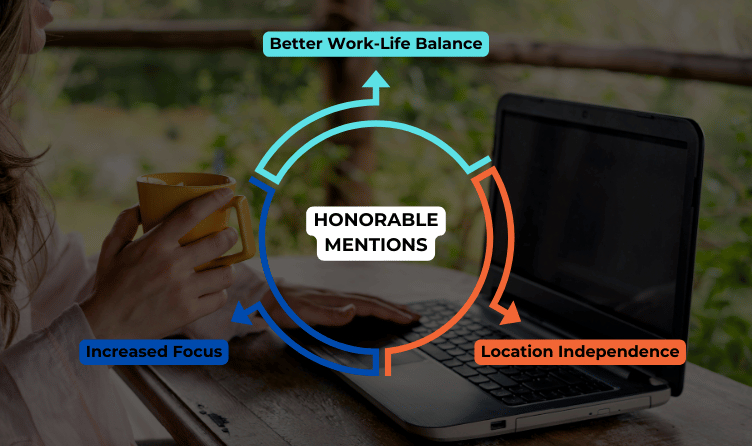How Remote Work Can Benefit Your Small Business?
5 Mins Read
Published on: 17 June 2021
Last Updated on: 15 November 2024

toc impalement
Many small business owners disparage the very concept of remote work. The way these individuals see it, being present is a big part of any job. As such, employees cannot effectively perform their respective job duties outside of a formal work environment.
However, as the COVID-19 pandemic has shown us, there are numerous benefits to allowing employees to work remotely. People who were once against the idea are slowly shifting their perspective.
If you’re still on the fence regarding whether or not to allow your team members to work remotely, consider the following perks.
Benefits of Remote Work

The COVID-19 Pandemic was indeed one of the earth-shattering incidents of our time. The incident successfully managed to change the total dynamic of the world.
Everything about the world changed as businesses slowly realized the potential or the benefits of working remotely from home. The idea was initially looked down upon as the whole perspective of people is shifting.
However, the tides shifted, and the world realized the benefits of working from home. Here are three of the most important benefits of working from home.
Heightened Productivity

One of the key reasons so many business owners are opposed to remote work is the idea that operating from home decreases productivity.
One line of argument is that remote work is hard to monitor. As a result, people might end up cutting some slack. The line of argument is understandable, but the results speak differently. Research has shown that, if anything, the ability to work remotely is conducive to an increase in productivity.
Regardless of your opinion, heightened productivity is a good thing for your financial bottom line.
This would initiate a cascading effect where you would effectively deliver work at a faster rate and without any problems. Which would help improve customer satisfaction. Business owners looking for ways to tangibly measure productivity levels would do well to invest in dependable business intelligence solutions.
Reduced Stress

It’s no secret that working a traditional nine-to-five job is stressful. While heavy workloads can certainly be a contributing factor, having to conform to a needlessly rigid work schedule is highly conducive to workplace stress.
As many businesses have come to learn during the COVID-19 pandemic, most employees don’t need to be physically present in a formal office to do their jobs effectively and efficiently. So, if you’re still requiring your team members to report to the office on a daily basis and keep work hours that have no real bearing on productivity levels, it’s time to reexamine this.
For many members of the workforce, reporting to a traditional workplace serves no purpose outside of contributing to stress. Going to the office is a whole regime. One needs to get up on time, brave difficult commutes, and a myriad of other things. All of these factors make the office a task.
This can be particularly stressful for employees who have children and other family obligations to attend to. So, if the reason for your continued opposition to remote work is something akin to “Things have always been this way,” there’s never been a better time to change your way of thinking.
Increased Employee Retention

Employers have been treating employees as expendable commodities. However, employees are done with this and want something more. This has become apparent in people’s refusal to work for companies that offer unbelievably low wages and refuse to provide many benefits.
Furthermore, many people who grew accustomed to working remotely during the pandemic, are opting to quit their jobs rather than return to the office. While some employers may regard this behavior as perplexing, it’s very easy to understand from a worker’s perspective.
Through working from home, they’ve come to realize that reporting to an office is largely pointless, and if their employers are going to insist on making them engage in this fruitless exercise, they’re going to pursue other opportunities. Conversely, by continuing to allow your employees to work remotely, you’ll be setting the stage for solid retention rates and heightened company loyalty.
For the longest time, many of us have simply accepted reporting to an office as an inescapable part of the work experience. However, throughout the course of the COVID-19 pandemic, a large number of enterprises and individual workers have come to realize that most desk jobs don’t require a regular physical presence in a traditional workplace.
Although some business owners still regard remote work as a radical concept, it can prove highly beneficial to both members of the workforce and their respective employers. Hence, now is the time for your business to shift to a more hybrid work module.
Honorable Mentions

We have listed three of the most significant benefits of remote work. However, we are far from done, and here are some more benefits of remote work that you need to know about.
These benefits are like added benefits that relate to the human side of things. Therefore, approach this section with that consideration.
Better Work-Life Balance
The foremost reason for you to shift to a remote work setup is to have a better work-life balance. This balance is essential for an individual to have a healthy life. Which would effectively add to an employee’s productivity and loyalty towards the company.
Increased Focus
Increased focus is one of the benefits of remote work that is not talked about much. Remote employees tend to focus more on the job than anything else. This is primarily because remote employees are usually isolated from one another. Therefore, they get their job done with more precision.
Location Independence

Lastly, remote work allows an individual to work from anywhere. This is one of the best things about having a remote job. You can simply take your laptop and move around and still get your work done.
The Final Thought
In summation, these were some of the most significant benefits of remote work that you need to know about. So, if you are considering shifting to a remote responsibility, you can do so quickly and without overthinking. Keep following our page for more such content.
Read Also:


















Comments Are Closed For This Article